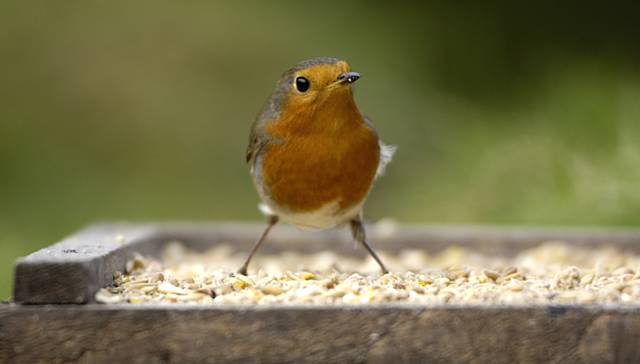Birds turning up the dawn chorus volume
Date published: 10 May 2020

Photo: Ray Kennedy
A Robin on bird table in a garden
Are the birds singing louder this spring? It’s a question sprung on conservationists quite a lot this year.
“If you listen to the sound of the dawn chorus this week, wildlife doesn’t seem to be missing us at all,” said Alan Wright, Campaigns Manager at the Wildlife Trust for Lancashire, Manchester and North Merseyside.
“There are two factors involved here, we believe. The lack of noise pollution from fewer vehicles being on the road is definitely opening up gaps for our wild birds to really let rip this year, as they are looking for love on their patch. And people have time to notice wild sights and sounds. Blackbirds, robins, great tits and wrens seem extra loud.”
Conservationists are not underestimating the tragic human cost of Covid-19, but with the virus forcing many of us to stay at home, how is wildlife coping?
Alan said: “I really hope we are learning from this crisis. Many lives have been lost as the virus has spread but I am sure the health measures have helped to save many thousands of people.
“And we shouldn’t be afraid to mention this knock-on effect on that is benefiting our wildlife. Let’s hope we can look at this and improve the way we live in the future in a way that supports nature.
“The songs of thrush and robin are filling the early mornings with sound. In some cases, it might just be that we are noticing the birdsong more as the noise from vehicles and general hubbub has turned down its volume.
“I certainly think that many people go through their lives without noticing some of the wonderful noises and the creatures making those noises around them.”
Many wildlife experts also believe that the lessening in pollution, globally, is also affecting animal behaviour. Alan said: “Our swallows and swifts are now flying back into urban areas which have always had problems with fumes from cars and industry. They are breathing fresher air into their little lungs, which can only be good for them.”
The Wildlife Trust for Lancashire, Manchester and North Merseyside is part of the Wildlife Trusts, the UK’s biggest conservation charity. In the North West the Wildlife Trust has more than 30,000 members who support its work in creating Nature Recovery Networks both here and across the United Kingdom.
Do you have a story for us?
Let us know by emailing news@rochdaleonline.co.uk
All contact will be treated in confidence.
Most Viewed News Stories
- 1Middleton school hails another outstanding inspection result
- 2Former councillor and hospital campaigner Jean Ashworth has died
- 3No trams between Oldham and Rochdale this Sunday
- 4Drugs and cash seized during morning raids at suspected stash houses
- 5Northern Healthcare opens supported living service in former Rochdale hotel
To contact the Rochdale Online news desk, email news@rochdaleonline.co.uk or visit our news submission page.
To get the latest news on your desktop or mobile, follow Rochdale Online on Twitter and Facebook.


